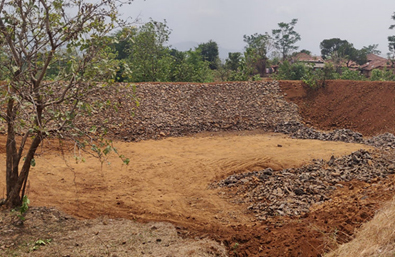Applied Jainism – is a social platform to collaborate & discuss contemporary issues on sustainable co-existence (Parasparopagraho Jīvānām / परस्परोपग्रहो जीवानाम् where the principle of Jain philosophy & spirituality can guide us and become the torch bearer in the modern age. www.appliedjainism.in
Jainavenue is a medium to serve the spiritual path of Jainism

Dilip Jain founded the dJED Foundation with the main aim to move the world’s attention from Economy to Ecology. According to him the existing materialistic western belief system, which underpins the economy and all of its systems, has been destructive for species, societies, and spirituality and the world needs a model that allows people to learn, be, and do everything in harmony with nature and life.
Entrepreneurship, Education, and Environment are the 3E’s of Dilip’s work ethic and his NGO dJED Foundation has been working at grass root level on same 3E’s on various projects including at Chinchwadi, an adivasi village in Maharashtra. As against cities, where water flows from tap 24*7, in water scarce Chinchwadi one bucket of water requires 1-2 kms uphill trek in scorching summer heat and as a result women folk spend almost two-three of hours of day in just fetching water. Dilip Jain and his team has worked extensively over the last two years in restoring water, soil, and forest to find a sustainable solution to this perennial problem. It is a great example of 3Es in practice. The key aspects of the project include:
- Construction of a new open well in the valley below.
- Construction of a new lake on the plateau above.
- Plantation of 1000 trees.
- Reclamation of topsoil from check dam and its repair.

Start of artificial lake construction to help with groundwater recharge and water storage at Chinchwadi, Maharashtra | Photo by @rayyanmonkey
dJED Foundation wants to achieve Gandhian dream of Gram Swaraj by working in one village at a time. We want to focus on top 2-3 issues of the village where we work while comprehensively addressing other related problems. There are around 10 lacs villages in India, but most are facing poverty and joblessness and people have to migrate to cities for odd jobs and are increasingly getting addicted to various vices. Life is a struggle and meaningless for most. While as a country we are growing but the social inequity, ecology degradation and spiritual misalignment is at its peak.

It is our belief that the most fundamental necessity for Gram Swaraj is that each village has good soil, water, forest, and animals. When these elements are in place, a person can thrive and survive in his own little village with his family, without too much dependence on outside world.
Thus, all our work attempts are to Integrate 7 J’s – Jameen, Jal, Jungle, Jaanwar, Jwala, Jeevan and Jameer. We aim for – 10*10*10 impact i.e., for every 10 youth that we train, we impact 100 people in local communities and influence 1000 people in cities.
Our direct initiatives are:
- SAHYADRI, Bombay, Maharashtra (bio-diversity hot spot)
Adopted Chinchwadi Adivasi village with 100+ households. In the last 2 years, here we work on 5W’s – Water, Waste, Women, Wealth, and Wisdom. We have done comprehensive work on watershed management of the village.
Aadi Maanav Academy, where tribal’s of Chinchwadi teach how to Love, Learn and Live as indigenous communities do – in harmony with inside and outside nature.
Me2 Kids Club, where we have 100+ families in Mumbai as members and we expose city children to NAV – Nature, Adventure and Volunteering.
- NARMADA/ PAVAGADH, Baroda, Gujarat (holy river/ mountain)
RevAranya, where through community participation we are developing a forest on banks of river Narmada by planting 120 varieties of 700+ saplings. This will become Eco and Edu tourism centre.
- ARAVALI, Bisalpur, Jawai, Rajasthan (wildlife conservation)
Through Save Jawai initiative Wildlife, we focus on Jeevdaya/ Ahimsa through plastic waste management and contextual education that can help in local wildlife/ bio-diversity conservation and regeneration.
Our indirect initiatives include Germinator program where along with Global Ecoversities we support 12 projects who are working to build a new and better world by seeding fresh alternatives in the education space.
About the Author
Dilipji who has been working tirelessly to make a Maharashtra Village self-sustainable following the principles of 3E – Education , Entrepreneurship and Empowerment.

